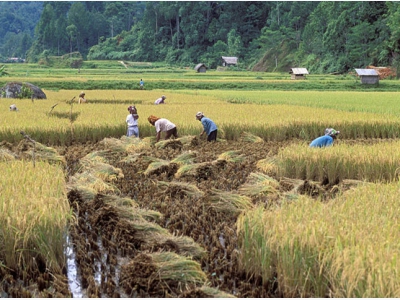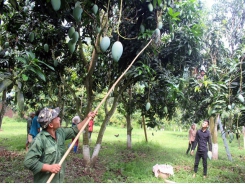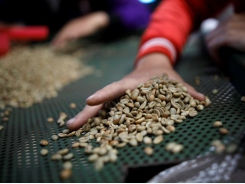World Bank suggests reducing rice-growing areas in Mekong Delta

Most Vietnamese agricultural products are sold in raw form and regularly placed in the low or medium quality segment in the international market.
The World Bank (WB) has suggested Vietnam scale down paddy cultivation in the Mekong Delta to reduce the environmental impact, and at the same time promote high quality and special rice strain farming.
The remaining land will be utilized to grow other high-valued crops that are adaptable to climate change, expert Pham Hoang Van from the WB said at the panel on restructuring agro-industry to adapt to climate change in the Mekong Delta, part of a conference on climate resilience and sustainable development of the Mekong Delta region taking place in Ho Chi Minh City earlier this week, Tuoi Tre reported.
Pham Hoang Van from the WB speaks at the panel. Photo: Quang Dinh/Tuoi Tre
According to Van, the Mekong Delta and Vietnam, in general, have achieved considerable growth in agricultural production thanks to increased spending on environmental protection.
The region’s agriculture growth has so far relied on expanding production or improving land use and other natural resources. However, the intensive application of fertilizer and other agricultural chemicals has brought about adverse effects on the environment including deforestation, soil degradation and water pollution.
Additionally, there is still a gap between agricultural and non-agricultural income as well as increasing inequality of income in rural areas.
Most Vietnamese agricultural products are sold in raw form and regularly placed in the low or medium quality segment in the international market.
Therefore, the Mekong Delta’s agro-industry should boost the value and reduce the inputs or “produce more with less”, in other words, this industry must bring benefits to the manufacturers, consumers and the ecology as well by minimizing the use of soil, water, labor forces, fertilizer, chemicals and energy and reduce greenhouse gas emissions, pollution and waste.
According to Van, Vietnam needs to cease to portray itself as a low-cost goods provider in order to move towards a sustainable position in the market as a reliable supplier of high quality and safe products.
Có thể bạn quan tâm
Phần mềm

Phối trộn thức ăn chăn nuôi

Pha dung dịch thủy canh

Định mức cho tôm ăn

Phối trộn phân bón NPK

Xác định tỷ lệ tôm sống

Chuyển đổi đơn vị phân bón

Xác định công suất sục khí

Chuyển đổi đơn vị tôm

Tính diện tích nhà kính

Tính thể tích ao hồ



 New smartphone apps to help farmers
New smartphone apps to help farmers  Project aims at PPP boost in agricultural development
Project aims at PPP boost in agricultural development